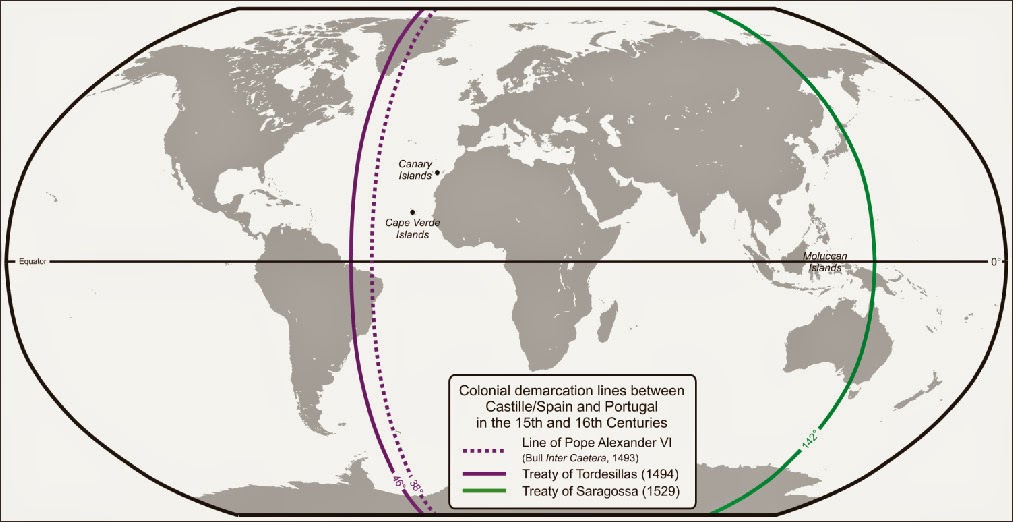This blog post really has nothing to do with the flag of Portugal, but rather something I ran across in the recent past that I 'flagged' (mark for attention or treatment in a specified way), concerning Portugal.
What I flagged was something I came across on the Collins DNA Project. A researcher claims to descend from Valentine Collins and shows country of origin as Portugal.
Another issue is this researchers Y-DNA results do not match the DNA results of 2 Valentine Collins lines that are well researched. That's a subject for another post, coming soon.
I have no reason to believe the Valentine Collins line has an origin in Portugal. No family lore, no documentation, no DNA matches, either with Y-DNA or atDNA (FTDNA's Family Finder, or GEDmatch), none in Portugal, the Azores, Brazil, or any of the Portuguese community's in the U.S.
The only 'family lore' I grew up with is 'we were once Indians'.
Y-DNA of Portugal
"A large majority of the male lineages (85%) could be classified as belonging to three basic haplogroups, R1b, J, and E1b1b. While R1b, accounting for more than half of the lineages, is a characteristic marker of many different West European populations, haplogroups J and E1b1b and its subclades consist of lineages that are typical of the circum-Mediterranean region. Haplogroup I is also found but with a lower frequency than R1b. The typical Berber haplogroup E1b1b1b (M81) has little relevance, it is only found at a frequency of 5–6%."
https://en.wikipedia.org/wiki/Demographics_of_Portugal
The Portuguese claim is an old myth concerning the people who were called Melungeons. Where this myth started I have no idea. I do know that the majority of Portuguese people are of the Caucasian race, as were the early inhabitants of Portugal (Lusitanians). This is contrary to the myth often stated that the people who were called Melungeons got their dark skin tones from the Portuguese.
Here are two quotes from articles on the subject by researchers that I respect.....all text is copyright the authors......
From the August 2002 issue of Tennessee Ancestors "Opening Doors in Melungeon Research" written by Pat Spurlock:
"Another tradition concerning Melungeon origins is that they are Portuguese. This is because of testimony given by some historical people stating they were Portuguese, "Portygee" or other variation, or at least that is what the listener thought was said.
Hopping from 1750 Virginia and North Carolina to the Mediterranean or anywhere else takes more than a leap of faith. To my knowledge, no researcher has yet documented these stated ties to Portugal. Assuredly, many Americans whose families came to this country hundreds of years ago may have originated in Portugal, but "Portuguese" is not an ethnic catchall to apply randomly to hearsay evidence, or even worse, to no evidence at all.
Statements made before 1900 referring to the Melungeons as Portuguese cannot, to my knowledge, be traced to original Melungeon oral history, church, civil, or legal documents. Any such post-1900 statements likely came from ideas found in newspapers and popular magazines."
This second article from BanjoHistory.com , October 1, 2002, "Mellungeons and Myth" written by George R. Gibson:
"It appears to me that the debate about Melungeons has more to do with creating myths about ones ancestors than it does with exploring the historical record. Some genealogists deny that any Melungeon families had African ancestry. They describe Melungeons as a people with Indian and European ancestry.
These researchers ignore the early mixing of eastern Indian tribes with Africans as well as Europeans. Some claim a group of Portuguese sailors, stranded in early America, mixed with native Indians and later with Europeans to form Melungeon families. I find no evidence for this in the historical record. If this theory were true, however, Melungeons would still have some African ancestry.
Atlantic Creoles, with both Portuguese and African ancestry, would have had a large presence among any group of Portuguese sailors in early America. There are other theories that claim Melungeons have Turkish, Gypsy, Jewish or some other ancestry. There is no doubt that there was a remarkable mixture of people in early America. There is little evidence at this time, however, to support the more exotic claims for Melungeon ancestry."
http://www.banjohistory.com/article/detail/2_mellungeons_and_myth
I find it interesting that both these articles were written in 2002, but yet the Portuguese myth is still alive on the World Wide Web, go figure ?
Another often overlooked important historical event was the Treaty of Todesillas:
http://www.u-s-history.com/pages/h1028.html
https://en.wikipedia.org/wiki/Treaty_of_Tordesillas






